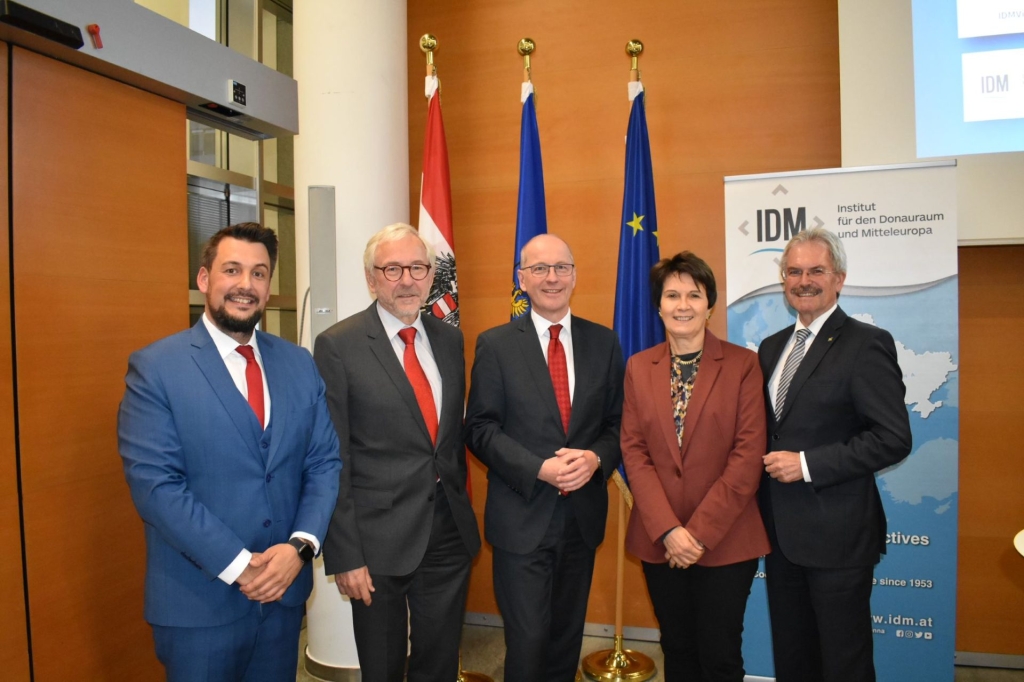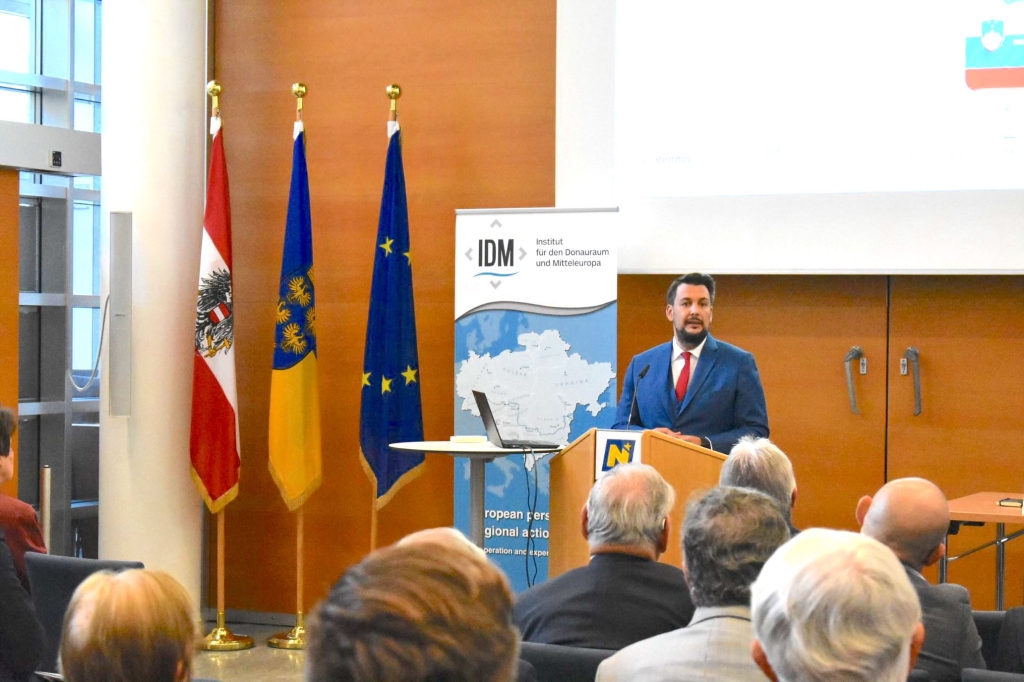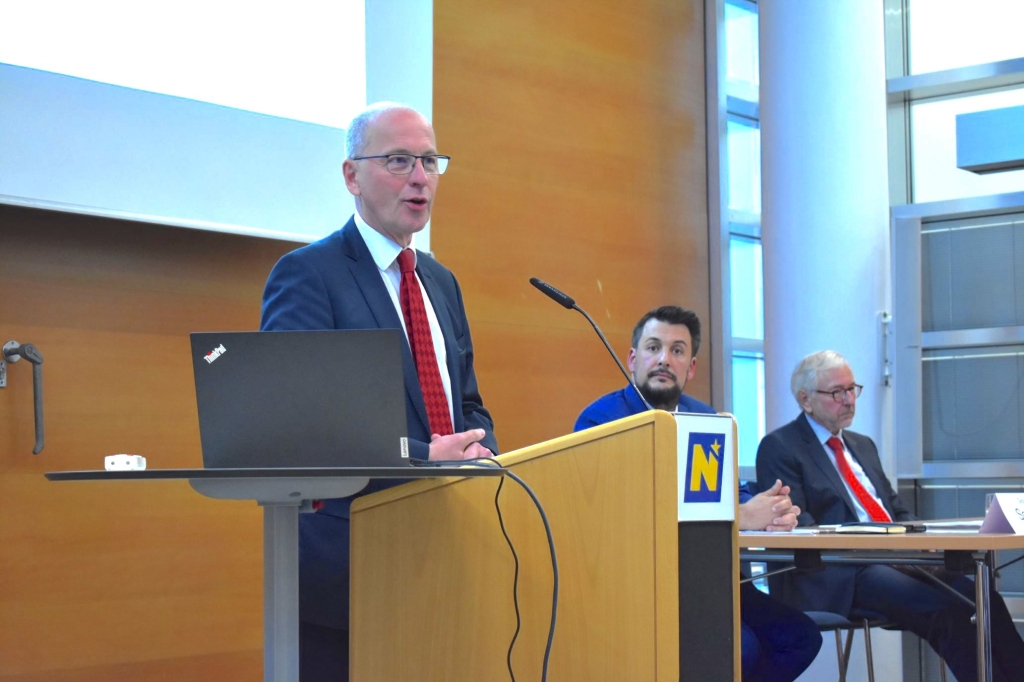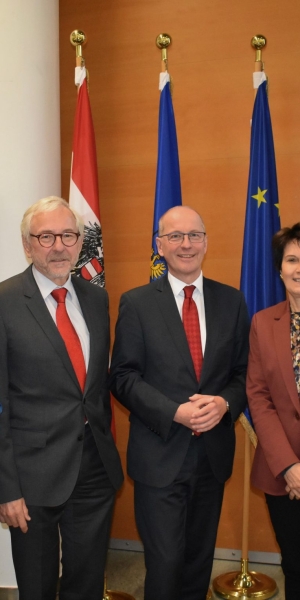IDM elects new board, Friedrich Faulhammer confirmed as chairman
After Erhard Busek’s passing in spring 2022, Friedrich Faulhammer, Rector of the University of Continuing Education Krems (UWK), will take over the chairmanship of the Institute for the Danube Region and Central Europe (IDM). Faulhammer: “IDM is a guarantor for cross-border expertise and cooperation.”
5 October 2022, Vienna/St.Pölten – At the ordinary General Assembly of the Institute for the Danube Region and Central Europe (IDM) on 4 October 2022 in the Landhaus St. Pölten, the members present elected the new Institute Board. In addition, the meeting confirmed the candidate Friedrich Faulhammer as the chair of the association for the next three years. Faulhammer has been Rector of the University of Continuing Education Krems (UWK) since 2013. Before that, the law graduate was Section Head and Secretary General at the Federal Ministry of Science and Research, where he played a key role in shaping Austrian and European higher education policy. Faulhammer had taken over the interim chairmanship of the Executive Board together with Rudolf Schicker after the sudden passing of Erhard Busek in March 2022.
“I am pleased that with Rector Faulhammer we have gained a chairman who has been closely associated with the IDM for several years. We have already been working together successfully since 2014 within the framework of the Danube Rectors’ Conference (DRC) and I appreciate his vision for the future of the IDM,” says Sebastian Schäffer, Managing Director of the Institute. “This election is an ideal course to enter the IDM anniversary year 2023 with momentum and new ideas.”
Showing connections in the region
The IDM used the general meeting, which could again be held in personpersonally this October, to take stock of recentthe past months. “IDM expertise is more in demand today than ever before,” said Schäffer. This is shown, for example, by the many media appearances since the beginning of the year. “We are experiencing an increasing demand for well-founded assessments of the developments in the countries of East-Central and South-Eastern Europe.” One reason for the increased attention is undoubtedly Russia’s war against Ukraine and the accompanying crises. At the same time, one thing has become clear in recent months: country knowledge alone is not enough. Schäffer is convinced: “The current challenges show that more knowledge of the interrelationships beyond national borders is needed in order to be able to assess causes and consequences. The IDM encompasses a team of experienced border crossers who are willing to step beyond the edges of disciplines, countries and paths of thought.”
The new chair Faulhammer also emphasises: “The IDM is a guarantor for cross-border expertise and cooperation in the region. In the coming years, we will continue to expand competences at the Institute and, together with our cooperation partners in the region, we want to focus even more purposefully on close cooperation between research and other areas of society. Thanks to our committed new board, I am confident that the IDM will raise its profile even more in the coming years.”
Looking back at a turbulent year
“The year 2022 started with unexpected turbulence. Ukraine, its neighbouring countries and ultimately all of Europe were painfully reminded by Putin’s invasion of Ukraine on 24 February 2022 that peace and democracy cannot be taken for granted,” says Schäffer. “The IDM was not only shaken by the war, but also by the losslost of its long-time chairman, Erhard Busek, on 13 March 2022. His critical views are missing in everyday life.” The history of Central Europe and the IDM, founded in 1953, are closely intertwined. Questions of European integration and enlargement as well as processes of democratisation are among the central topics of the regional think tank today. “All the more so, since Erhard Busek’s death, we have increasingly sought exchange with the members of the Board of Directors and the International Council, which Erhard Busek co-founded. Not least thanks to his commitment, the IDM is very well positioned today and not only has a powerful team, but also financial stability based on longer-term funding,” Schäffer adds.
Creativity against scepticism
The IDM wants to counter the current scepticism about science and democracy with well-founded expertise and target-group-oriented formats. The English-language podcast CEE – Central Europe Explained – has 40 episodes to date, and a third season is in preparation. With around 60 events in Austria and the target countries, the IDM once again presented an ambitious event programme in the previous year. In addition, the Institute produced numerous in-house publication formats, such as the IDM Policy Paper Series (IDM PPS), the thematic magazine Info Europa, which is published three times a year as a supplement to the daily newspaper “Die Presse” as well as a free e-paper, and the scientific journal Der Donauraum. The IDM will continue to develop formats and experiment with creative ideas in the following business year, when it celebrates its 70th anniversary. Because “we don’t want to force anyone to take an interest in the region. We would rather show with our daily work that it is worthwhile to look beyond the borders,” says Schäffer.
Further information
Contact
Dr. Daniela Apaydin
Institute for the Danube Region and Central Europe (IDM)
Hahngasse 6/1/24 | 1090 Vienna
T: +43 1 319 72 58 21





